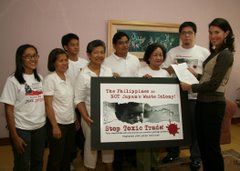08 Oct. 2007. -- Magkaisa Junk JPEPA, a coalition of NGOs and mass movements, today pressed anew for the junking of the Japan-Philippines Economic Partnership Agreement, calling the agreement constitutionally and legally toxic.
In a mock boxing match, an oversized JPEPA is shown being knocked out by a determined Inang Bayan, symbolizing the people's victory over the controversial economic argreement. A crowd of some 2,000 automotive workers, urban poor, and civil society groups was there to bear witness to the event.
Photo by Gigie Cruz/GAIA. The group stressed that in the five face-offs between the government panel and the coalition's organizations in Senate hearings, the government has failed miserably in defending the economic pact with
The group stressed that in the five face-offs between the government panel and the coalition's organizations in Senate hearings, the government has failed miserably in defending the economic pact with
"In spirit and in substance, JPEPA represents an insidious and patent violation of the 1987 Constitution and our laws. The only remedy to this anomaly is the immediate junking of the agreement," Magkaisa Junk JPEPA Coalition said.
The group said that the GMA administration abused its constitutional powers when it signed an agreement that clearly surrenders the sovereignty of the country to the Japanese. "If ratified, JPEPA would effectively subjugate the Philippine economy under the Japanese economy since it grants one-sided concessions to the other party," the coalition said. "The government acted in violation of its mandate to represent the interest of the Filipino people and uphold the country's sovereignty."
Photo by Gigie Cruz/GAIA. Submission to JPEPA also means that the government would serve as an insurance company to Japanese investors, undermining both the integrity of the State and the sovereignty of the Filipino people. "Under Article 96 of JPEPA, the government is obliged to compensate Japanese investors should they incur losses from damages due to state of emergency such as revolution, insurrection, and civil disturbance, among others. This compromises the independence of the Philippine State and undermines the Filipino people's exercise of their sovereign rights," the coalition added, explaining that liberally construed, this provision actually attaches unfair and anomalous obligations to supreme acts of sovereign will such as popular uprisings.
Submission to JPEPA also means that the government would serve as an insurance company to Japanese investors, undermining both the integrity of the State and the sovereignty of the Filipino people. "Under Article 96 of JPEPA, the government is obliged to compensate Japanese investors should they incur losses from damages due to state of emergency such as revolution, insurrection, and civil disturbance, among others. This compromises the independence of the Philippine State and undermines the Filipino people's exercise of their sovereign rights," the coalition added, explaining that liberally construed, this provision actually attaches unfair and anomalous obligations to supreme acts of sovereign will such as popular uprisings.
The coalition also urged Senate to exercise its broad oversight powers and to correct the constitutional error committed by the government by rejecting the agreement.
Photo by Gigie Cruz/GAIA. "Lopsided provisions in JPEPA prove that the government has usurped powers that are accorded to Congress," it said. "Articles 4, 18 and 20 of JPEPA, which commit the country to eliminate duties and taxes on goods imported from Japan and the repeal of laws that obstruct the implementation of the deal, abuse powers that are exclusively delegated to Congress by the Constitution."
"Lopsided provisions in JPEPA prove that the government has usurped powers that are accorded to Congress," it said. "Articles 4, 18 and 20 of JPEPA, which commit the country to eliminate duties and taxes on goods imported from Japan and the repeal of laws that obstruct the implementation of the deal, abuse powers that are exclusively delegated to Congress by the Constitution."
"The Constitution grants the power of taxation to Congress. This cannot be overturned simply by Japanese negotiators and Filipino officials conspiring against the future of the
It likewise warned Senate against other constitutionally and legally onerous provisions in JPEPA. "JPEPA goes against the constitutional mandate on the preferential use of Philippine products. What's worse is that reciprocity under the deal is grossly uneven, with Japanese products substantially gaining greater access to Philippine market and Filipino products still facing stiff market barriers to enter
According to the coalition, JPEPA weakens the negotiating power of the
Photo by Gigie Cruz/GAIA. Magkaisa Junk JPEPA implored the Senate to junk the deal. "Today is the last hearing of the Senate on an agreement whose anomalous nature has finally unraveled. There is no reason to believe that the government panel would still be able to sugar-coat a biased agreement. JPEPA must be rejected," the coalition implored.
Magkaisa Junk JPEPA implored the Senate to junk the deal. "Today is the last hearing of the Senate on an agreement whose anomalous nature has finally unraveled. There is no reason to believe that the government panel would still be able to sugar-coat a biased agreement. JPEPA must be rejected," the coalition implored.
More photos:
All photos by Gigie Cruz/GAIA.












No comments:
Post a Comment